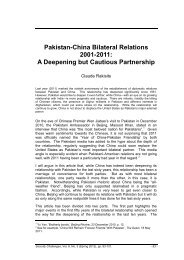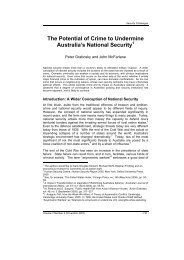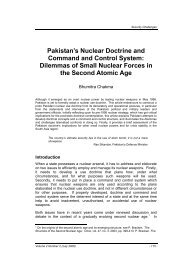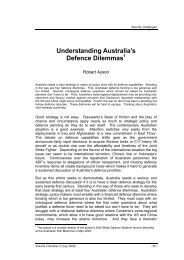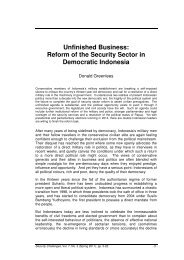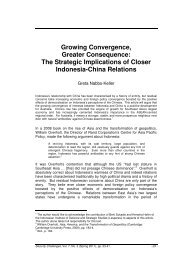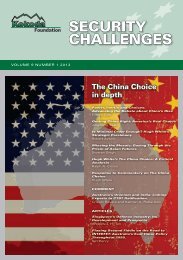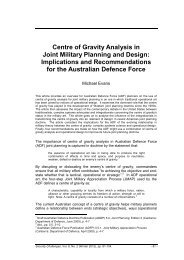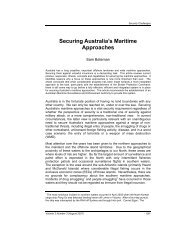The Transformation of Triad - Security Challenges
The Transformation of Triad - Security Challenges
The Transformation of Triad - Security Challenges
You also want an ePaper? Increase the reach of your titles
YUMPU automatically turns print PDFs into web optimized ePapers that Google loves.
Roderic Broadhurst and Lee King Wa<br />
state. <strong>The</strong> violence <strong>of</strong> the triad or ‘dark society’ plays a role in the success <strong>of</strong><br />
the various forms <strong>of</strong> criminal enterprise that have expanded in the lucrative<br />
broader China and international illicit markets. <strong>The</strong>se illicit markets, history<br />
would suggest, survive in environments where corruption flourishes and<br />
government underestimates, 227 or colludes with the actors in, underground<br />
economies—the net becomes so wide that the fish swim through—as the<br />
Chinese idiom suggests. Some <strong>of</strong> these markets are relatively new such as<br />
copyright theft, waste disposal, internet-driven gambling or scams while<br />
smuggling (including exotic animal species and products 228 ), adulteration <strong>of</strong><br />
products, 229 tax avoidance and money laundering continue to evolve and<br />
exploit the disconnect between international standards regarding money<br />
laundering and local practice. 230<br />
With the advent <strong>of</strong> the ICAC in the 1970s, the enactment <strong>of</strong> OSCO and<br />
related laws in the 1990s, law enforcement shifted from symbiosis (partial<br />
capture) to one <strong>of</strong> concerted hostility towards organised crime and sustained<br />
suppression <strong>of</strong> triad subculture that helped transform them to less visible and<br />
more flexible forms. More research is needed to explore and clarify the<br />
impact <strong>of</strong> the post-OSCO enforcement strategy, the role <strong>of</strong> penalty<br />
enhancement, the effects on triad morphology and the extent <strong>of</strong> any spillover<br />
from the political–criminal nexus in China. 231 <strong>The</strong> presence <strong>of</strong> triads<br />
remains significant, although members are as likely to appear in business<br />
suits as sporting tattoos, and to engage in financial manipulation as well as<br />
extortion. 232 Nevertheless, we lack the auto-biographical accounts or the<br />
transcripts <strong>of</strong> special commission and the testimony <strong>of</strong> former triads as has<br />
occurred among mafia groups in the United States or Italy. 233 Thus our key<br />
actors in contemporary ‘dark societies’ with some few exceptions remain<br />
elusive and, until comprehensive evidence is assembled, the subject <strong>of</strong><br />
conjecture rather than clarity.<br />
Attempts at suppression via confiscation <strong>of</strong> assets and enhanced penalties<br />
appear to require strengthening, and vigilance must be constantly<br />
227<br />
According to Mei, ‘China’s Social Transition and Organized Crime’, many scholars and<br />
legislators [e.g. Wang Hang Bing Deputy Chair <strong>of</strong> the National Congress, PRC] deny that<br />
organised crime exists—perhaps as Mei argues because it does not fit the conventional Hung or<br />
Qing form.<br />
228<br />
B. Moyle, ‘<strong>The</strong> Black Market in China for Tiger Products’, Global Crime, vol. 10, no. 1-2<br />
(2009), pp. 124-43.<br />
229<br />
Mei, ‘China’s Social Transition and Organized Crime’, p. 212.<br />
230<br />
Z. P. Sham, ‘Money Laundering Laws and Regulations: China and Hong Kong’, Journal <strong>of</strong><br />
Money Laundering Control, vol. 9, no. 4 (2006), pp. 379-400; P. He, ‘Money Laundering a True<br />
Problem in China?’, International Journal <strong>of</strong> Offender <strong>The</strong>rapy and Comparative Criminology,<br />
vol. 50, no. 1 (2006), pp. 101-6.<br />
231<br />
T. W. Lo, <strong>The</strong> Political-Criminal Nexus: <strong>The</strong> Hong Kong Experience; Chin and Godson,<br />
‘Organized Crime and the Political–Criminal Nexus in China’.<br />
232<br />
A trend also noted by Hill, ‘<strong>The</strong> changing face <strong>of</strong> the Yakuza’.<br />
233<br />
Paoli, ‘<strong>The</strong> Paradoxes <strong>of</strong> Organized Crime’; see however, the judicial reminisces <strong>of</strong> Liu, Hong<br />
Kong <strong>Triad</strong> Societies: Before and After 1997; and Yu, <strong>The</strong> Structure and Subculture <strong>of</strong> <strong>Triad</strong><br />
Societies in Hong Kong, with respect to recollections <strong>of</strong> incarcerated triad.<br />
- 36 - <strong>Security</strong> <strong>Challenges</strong>



